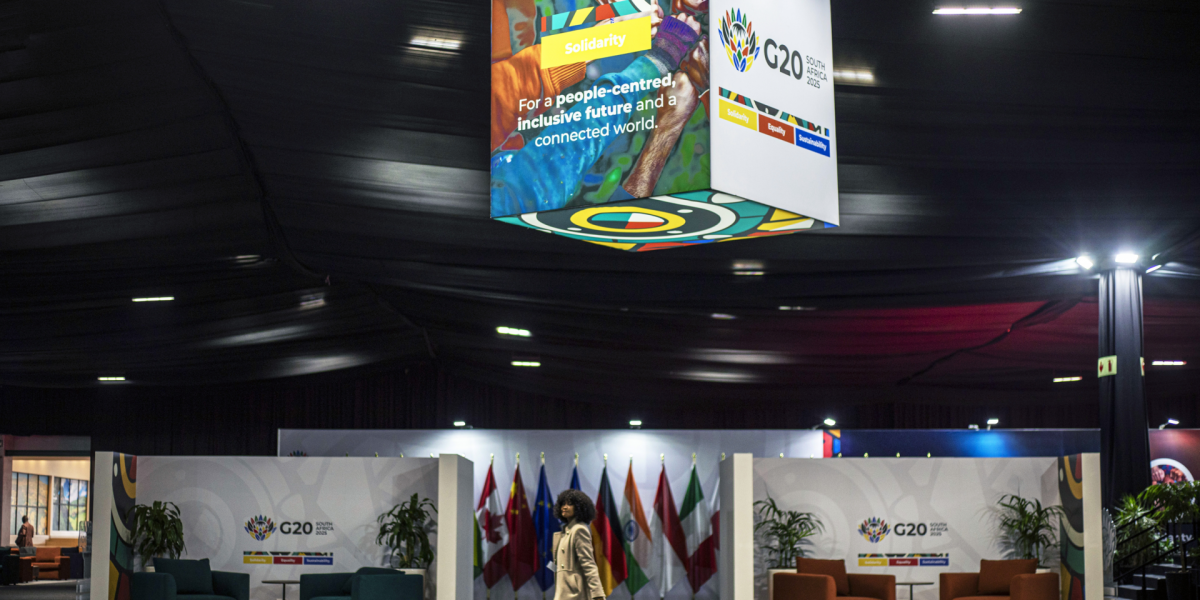Since South Africa assumed the G20 presidency, questions have lingered over its ability to extract meaningful outcomes from a forum increasingly affected by geopolitical discord. Taking the helm in a year marked by war, strategic rivalry and deepening geoeconomic fragmentation, South Africa inherited not merely a rotating chair but the unenviable task of steering an agenda through a club trying to function amid widening global divides. During the launch of South Africa’s G20 presidency, President Ramaphosa unveiled the theme “Solidarity, Equality, Sustainability”, which would serve as a banner under which to advance an undeniably ambitious agenda set against a global environment in which priorities are shifting, cooperation is fraying, and the space for consensus is narrowing. South Africa placed at the centre of its agenda the following overarching issues: 1) Strengthening disaster resilience and response; 2) Taking action to ensure debt sustainability for low-income countries; 3) Mobilising finance for a just energy transition; 4) Harnessing critical minerals for inclusive growth and sustainable development.
South Africa’s G20 presidency also had to unfold against the backdrop of a newly installed United States administration under President Donald Trump, determined to reassert its “America First” doctrine. The shift in Washington’s posture has placed the international system in a near constant state of reaction, as markets and governments absorb a rapid succession of tariffs, abrupt policy reversals and a style of diplomacy that has grown increasingly adversarial. South Africa has found itself squarely in this line of fire. Beyond the criticism directed at elements of its domestic policy, US officials have openly derided South Africa’s G20 priorities, reducing them, rather dismissively, to “DEI and climate change”. This dynamic has inevitably sharpened the debate over South Africa’s presidency, particularly whether it can meaningfully advance its agenda in the face of an openly combative United States, one that has even gone so far as to raise questions about the legitimacy of South Africa’s place within the grouping. The stakes, in other words, extend well beyond routine diplomatic friction.
As the Leaders’ Summit approaches this weekend, much of the commentary has fixated on whether South Africa can deliver a Leaders’ Declaration. That scrutiny has only deepened amid the uncertainty surrounding the extent of US participation, which has shifted from an outright declaration not to attend, to a warning against consensus, and now to an eleventh-hour reconsideration that has unsettled the process. This framing is misplaced. It overlooks the substantial groundwork already laid over the course of the year, where meaningful, if incremental, consensus was secured across several working groups on some of South Africa’s priorities. Even in the Finance Track, where it was difficult to reach an agreement, the presidency nonetheless shepherded a G20 Declaration on Debt. South Africa also succeeded in securing G20 endorsement of an Africa Engagement Framework, alongside significant milestones for the continent, such as the call to action on illicit financial flows and the launch of the AI for Africa Initiative. These outcomes are not peripheral. They constitute a tangible foundation for sustained African engagement with the G20 and signal the presidency’s capacity to advance substantive priorities despite a challenging geopolitical climate.
Secondly, and maybe more critically, the question is too narrowly framed. The real test at this year’s Leaders’ Summit is not whether South Africa alone can deliver a declaration, but whether the collective G20 membership in the room is prepared to stand behind an outcome that advances the world’s most urgent developmental priorities. Several countries have, in fact, signalled clear support for the presidency’s direction. Brazil, for instance, has stated its strong support of the adoption of a declaration, aligning itself firmly with South Africa’s push for a joint outcome. Germany has publicly declared that it fully supports South Africa’s G20 presidency, while the UK and France are also cited as backing South Africa’s efforts to secure a statement. India, Turkey, Japan and other attending members have continued engaging through the Sherpa negotiations, an implicit endorsement of the process even amid geopolitical noise. These positions underscore that the centre of gravity within the G20 is not uniformly obstructive and that there is a broad coalition willing to carry forward a developmental agenda.
Further, imperfect consensus at the G20 is not unprecedented. The G20 has, in moments of acute geopolitical tension, most notably in Hamburg, resorted to differentiated language to reflect diverging views on climate while still preserving a collective document. In that sense, the bar for action is not unanimity on every clause, but the political will to safeguard multilateral continuity.
By contrast, Argentina has pushed back on climate finance and global climate commitments, illustrating that the real friction lines run along substantive policy differences, not merely procedural objections. That is precisely why the burden cannot be placed at South Africa’s door alone. The world’s major economies must now demonstrate whether they are willing to protect the progress already made from debt discussions to climate action to more inclusive global governance. It is my view that a failure to endorse this work would not simply undercut South Africa. It would signal a regression on the defining challenges of our time of inequality, unsustainable debt and an accelerating climate emergency. In this sense, the credibility of the G20 rests on whether it can act collectively in the interest of global welfare, rather than allow unilateral obstruction to derail shared solutions.








